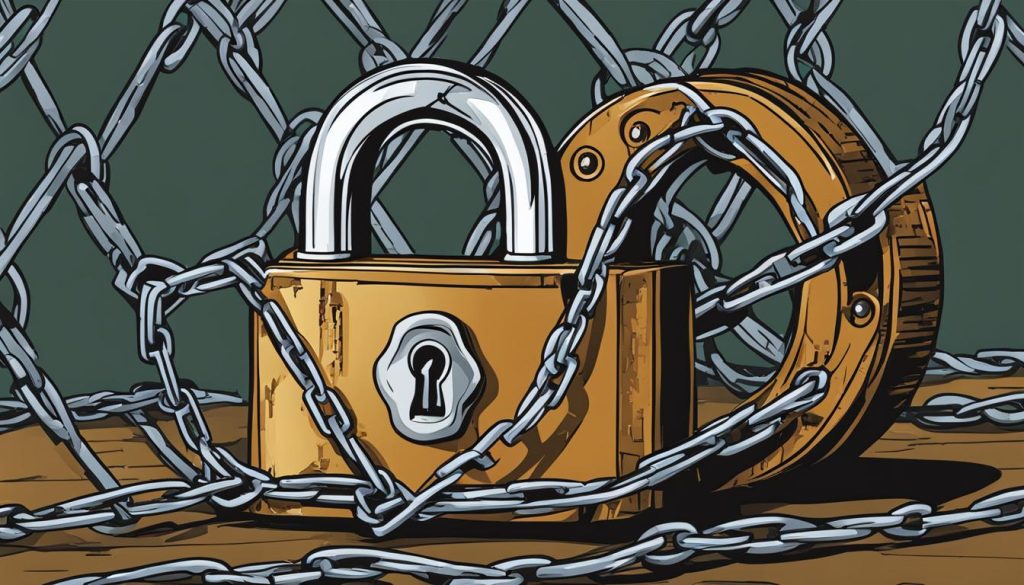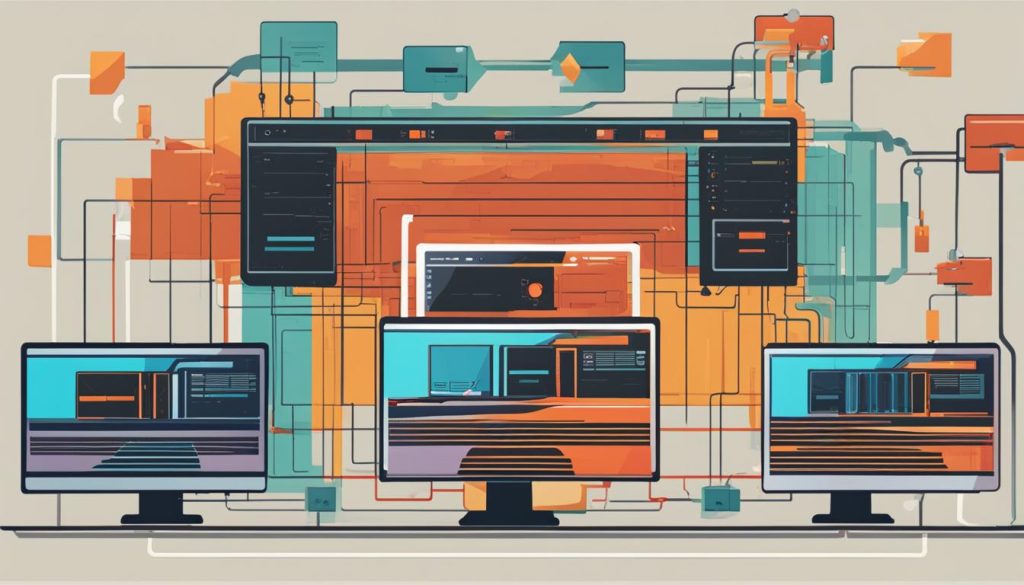In today’s interconnected digital world, where the internet has become an integral part of our lives, ensuring the safety of our online activities is paramount. Data breaches and cyber-attacks are on the rise, costing businesses billions of pounds every year. Safeguarding your website is not just a luxury but a necessity. This article will provide you with the knowledge and strategies to protect your online presence from hackers and malware.
As our digital footprint continues to expand, so do the risks associated with it. Maintaining a secure online presence is essential for protecting your website from cyber threats and maintaining the trust of your customers. Implementing robust web security solutions is the key to safeguarding your valuable assets and ensuring uninterrupted online operations.
Key Takeaways:
- Web security solutions are crucial for protecting your online presence and digital footprint.
- Data breaches and cyber-attacks can have severe financial and reputational consequences.
- Understanding cyber threats and their motivations is the first step towards effective web security.
- Common types of cyber threats include malware attacks, DDoS attacks, phishing attacks, and SQL injection attacks.
- Key components of web security include secure hosting, robust authentication mechanisms, and web application security.
The Need for Web Security in Today’s Landscape
With the increasing number of cyber threats in today’s digital landscape, it is crucial to understand the need for web security. The internet is a vast and interconnected space, and it has become a breeding ground for hackers and malware looking to exploit vulnerabilities in website security.
Data breaches have become a common occurrence, with malicious actors gaining unauthorized access to sensitive information and financial records. The consequences of these breaches can be devastating, both personally and professionally. The loss of sensitive data can lead to identity theft, financial loss, and damage to your reputation.
By prioritizing web security, you can protect your website from potential attacks and ensure the continuity of your online operations. Investing in robust security measures will not only safeguard your data but also instill trust in your customers, giving them the confidence to engage with your website without fear of cyber threats.
“The internet is filled with individuals and organizations with malicious intent. By implementing web security measures, we can stay one step ahead and protect our online presence.”
One of the most crucial aspects of web security is protecting your website from cyber threats. Hackers and malware can exploit vulnerabilities in your website’s code, allowing them to gain unauthorized access, inject malicious code, or steal sensitive data. Implementing reliable website security measures can help prevent these attacks, ensuring that your website remains safe and secure.
Some key areas of website security include:
- Secure Hosting: Choosing a reputable hosting provider that offers robust security features is essential for protecting your website from intrusions.
- Strong Authentication: Implementing multi-factor authentication and secure password policies helps prevent unauthorized access to your website.
- Web Application Security: Regularly updating and patching your website’s software and plugins can help address vulnerabilities and reduce the risk of exploitation.
- Employee Training: Educating your employees about the importance of web security and best practices can significantly enhance your overall security posture.
By investing in web security solutions and following best practices, you can mitigate the risk of cyber threats and protect your valuable online assets. Don’t wait until a cyber attack occurs. Take proactive steps to safeguard your website and ensure the safety and trust of your digital presence.

Understanding Cyber Threats
Cyber threats pose a significant risk to websites and can have devastating consequences. Cyber attacks refer to malicious activities carried out over the internet to gain unauthorized access to personal data, networks, or computer systems. The impact of these attacks can lead to the loss of sensitive data, disrupt website operations, and even cause website downtime. The motivations behind these attacks vary, ranging from financial gain to data theft, espionage, and even political motivations.
“Our website has experienced cyber attacks in the past, and the consequences were severe. Not only did it result in a significant financial loss, but it also damaged our reputation and customer trust.”
Cyber attackers often target websites to gain access to valuable information, such as credit card details, personal identification numbers, business trade secrets, and confidential customer data. This information can then be sold on the dark web for financial gain or used for various illicit purposes, including identity theft and fraudulent activities.
Consequences of Cyber Threats
Let’s take a closer look at the consequences of cyber threats:
- Loss of Sensitive Data: Cyber attacks can result in the theft or compromise of sensitive data, leading to severe financial and reputational damage.
- Disruption of Website Operations: Websites can experience significant downtime as a result of cyber attacks, affecting user experience, revenue generation, and customer trust.
- Financial Loss: Businesses can suffer significant financial losses due to the costs associated with recovering from a cyber attack, paying ransom demands, and potential legal liabilities.
- Reputation Damage: A cyber attack can tarnish a company’s reputation, leading to a loss of customer trust and loyalty.
- Regulatory Compliance Issues: In addition to financial and reputational damage, businesses may face legal consequences and regulatory fines if they fail to adequately protect sensitive customer data.
It is crucial for businesses to understand the seriousness of cyber threats and take proactive measures to safeguard their websites and digital assets.

| Cyber Threat | Description |
|---|---|
| Malware Attacks | Malicious software designed to infiltrate and damage computer systems, including viruses, worms, trojans, ransomware, and spyware. |
| DDoS Attacks | Distributed Denial of Service attacks aim to overwhelm websites or networks with excessive traffic, causing significant downtime. |
| Phishing Attacks | Phishing attacks trick individuals into revealing sensitive information through deceptive emails or messages, often leading to identity theft or financial fraud. |
| SQL Injection Attacks | SQL injection attacks exploit vulnerabilities in a website’s database to gain unauthorized access to sensitive data. |
Cyber threats are continuously evolving, with attackers finding new ways to exploit vulnerabilities. It is crucial for businesses to stay informed, implement robust security measures, and regularly update their web security protocols to protect against these threats.
Common Types of Cyber Threats
As we navigate the vast landscape of cyber threats, it is crucial to familiarise ourselves with the common types of attacks that pose a risk to our online security. By understanding these threats, we can better protect ourselves against malicious actors and safeguard our digital assets.
1. Malware Attacks
Malware attacks encompass a wide range of malicious software designed to infiltrate computer systems and wreak havoc. These include:
- Virus: A self-replicating program that spreads from one file to another, causing damage or disrupting system operations.
- Worms: Self-replicating programs that spread across networks, exploiting vulnerabilities and compromising system resources.
- Trojans: Disguised as legitimate software, trojans trick users into executing malicious actions, such as stealing sensitive information.
- Ransomware: Malware that locks critical files or systems, demanding a ransom from the victim in exchange for their release.
- Spyware: Software that covertly collects information about a user’s activities, often for malicious purposes.
2. DDoS Attacks
DDoS (Distributed Denial of Service) attacks aim to overwhelm websites or networks with an enormous volume of traffic, rendering them unavailable to legitimate users. These attacks can disrupt essential services and cause significant financial losses. Cybercriminals may employ botnets, networks of compromised computers, to carry out these attacks.
3. Phishing Attacks
Phishing attacks involve deceptive tactics to trick individuals into revealing sensitive information, such as passwords, usernames, or financial details. Cybercriminals often masquerade as trustworthy entities, such as banks or popular websites. They use emails, instant messages, or fraudulent websites to lure unsuspecting victims and exploit their personal information for nefarious purposes.
4. SQL Injection Attacks
SQL (Structured Query Language) injection attacks target websites with vulnerabilities in their database systems. Cybercriminals exploit these weaknesses to manipulate web application databases, gain unauthorized access, or extract sensitive information. By injecting malicious SQL code, attackers can bypass security measures and compromise the integrity and confidentiality of sensitive data.
“Being aware of the common types of cyber threats is the first step towards building a robust and resilient defence against potential attacks.” – Cybersecurity Expert
By understanding the nature of malware attacks, DDoS attacks, phishing attacks, and SQL injection attacks, we empower ourselves to deploy effective security measures to safeguard our online presence. Protecting against these threats requires a combination of robust security solutions, regular updates, and user vigilance.
| Type of Cyber Threat | Description |
|---|---|
| Malware Attacks | Various types of malicious software that infiltrate and damage computer systems. |
| DDoS Attacks | Overwhelm websites or networks with excessive traffic, causing significant downtime. |
| Phishing Attacks | Trick individuals into revealing sensitive information through deceptive emails or messages. |
| SQL Injection Attacks | Exploit vulnerabilities in a website’s database to gain unauthorized access to sensitive data. |

By remaining vigilant, adopting best practices, and partnering with reliable cybersecurity providers, we can fortify our defenses against these malicious cyber threats and ensure the safety of our online activities.
Key Components of Web Security
Web security is a multifaceted discipline that requires a comprehensive approach. To protect your online presence effectively, it’s important to understand and implement the key components of web security, including: secure hosting and infrastructure, robust authentication mechanisms, web application security, and adhering to best practices.
Secure Hosting and Infrastructure
Choosing a reputable hosting provider is the first step in securing your website. Look for providers that offer secure hosting environments, with robust security measures in place to protect against unauthorized access and data breaches.
Robust Authentication Mechanisms
Implementing strong authentication mechanisms adds an extra layer of security to your website. This includes measures such as multi-factor authentication, password complexity requirements, and session management techniques to ensure that only authorized users can access sensitive areas of your site.
Web Application Security
Web applications are prime targets for cyber attacks. Implementing web application security measures, such as input validation, secure coding practices, and regular security assessments, can help detect and prevent vulnerabilities that attackers may exploit.
Following Best Practices
Adhering to best practices in web security is essential for maintaining a secure online presence. This includes regularly updating software and plugins, conducting security audits, educating your team about common cyber threats, and implementing incident response plans. By following these best practices, you can minimize the risk of security breaches and protect your website from potential threats.
| Key Components of Web Security | Description |
|---|---|
| Secure Hosting and Infrastructure | Choose a reputable hosting provider that ensures a secure hosting environment to protect against unauthorized access and data breaches. |
| Robust Authentication Mechanisms | Implement strong authentication measures, such as multi-factor authentication and password complexity requirements, to prevent unauthorized access. |
| Web Application Security | Implement security measures in web applications, such as input validation and secure coding practices, to detect and prevent vulnerabilities. |
| Following Best Practices | Regularly update software and plugins, conduct security audits, educate your team about cyber threats, and implement incident response plans. |

In today’s digital landscape, web security is crucial for protecting your online presence. By implementing secure hosting, robust authentication, web application security, and following best practices, you can fortify your website against potential threats and ensure the safety of your digital assets.
Best Practices for Web Security
Implementing best practices is crucial for ensuring web security. By following these practices, we can significantly reduce the risk of falling victim to cyber attacks and maintain a secure online environment.
Regular Backup and Recovery Procedures
Regularly backing up your website’s data is essential in case of any unexpected incidents or security breaches. This ensures that you have a copy of your website’s content, databases, and configurations that can be restored quickly. Implement a reliable backup solution and set up automated backup schedules to ensure regular backups.
Software and Plugin Updates
Keeping your software and plugins up to date is crucial for maintaining web security. Developers regularly release updates that address security vulnerabilities and patch any weaknesses in their systems. Make it a priority to update your website’s content management system (CMS), themes, plugins, and any other software components to their latest versions.
Regular updates ensure that your website is equipped with the latest security features, reducing the risk of exploitation by attackers.
Employee Training and Awareness
Employees play a significant role in maintaining web security. It is important to provide regular training and awareness programs to educate employees about common cyber threats, security best practices, and how to identify and report suspicious activities. This empowers them to contribute to the overall security of your organization’s online presence.
Benefits of Best Practices for Web Security
| Benefits | Description |
|---|---|
| Minimize Data Loss | A regular backup and recovery strategy ensures that you can quickly restore your website and minimize data loss in the event of a security incident. |
| Reduce Vulnerabilities | By regularly updating your software and plugins, you can patch security vulnerabilities and reduce the risk of exploitation. |
| Enhance Security Awareness | Employee training and awareness programs improve the overall security awareness within your organization, empowering employees to detect and report potential security threats. |
| Protect Reputation | Implementing best practices helps protect your organization’s reputation by safeguarding customer data, preventing website defacement, and maintaining a secure online environment. |

By implementing regular backup and recovery procedures, keeping software and plugins up to date, and providing employee training and awareness, we can enhance our web security posture and reduce the risk of falling victim to cyber attacks.
Advanced Web Security Measures
In order to bolster your web security and protect sensitive information, it is crucial to go beyond basic practices and implement advanced measures. These proactive approaches involve various techniques such as web security testing, penetration testing, incident response, and vulnerability scanning.
Web Security Testing
- Web security testing, including penetration testing and vulnerability scanning, helps identify potential weaknesses and vulnerabilities in your website.
- Penetration testing involves simulating real-world cyber attacks to assess the resilience of your web infrastructure.
- Vulnerability scanning scans your website for known vulnerabilities, allowing you to address them before they can be exploited by attackers.
Incident Response
In the event of a security breach, having an incident response plan is crucial. This plan outlines the steps and procedures to be followed in order to minimize the impact of the breach and swiftly mitigate any further damage.
Swift Action
Time is of the essence when it comes to responding to a security breach. Taking swift action to contain and remediate the situation is vital to minimize the potential damage to your website and protect sensitive information.
By adopting these advanced web security measures, you can strengthen your web security defenses, proactively identify vulnerabilities, and respond effectively to security incidents.
Izeon Innovative Cyber Security Solutions
Welcome to Izeon Innovative, the leading provider of cutting-edge cyber security solutions in the United Kingdom. We are committed to safeguarding your digital assets and protecting your online presence from evolving cyber threats. With our comprehensive range of services, including network security, endpoint protection, data encryption, security audits, incident response, and forensics, you can trust us to fortify your cyber security defenses.
At Izeon, we understand the importance of network security in today’s interconnected world. Our experts work tirelessly to identify vulnerabilities in your network infrastructure and implement robust security measures to mitigate risks. With our state-of-the-art technologies, we proactively monitor your network for any suspicious activities and swiftly respond to potential incidents.
Endpoint protection is another crucial aspect of our cyber security solutions. We employ advanced tools and strategies to secure all devices connected to your network, including computers, mobile devices, and IoT devices. By implementing multi-layered defenses and proactive threat hunting, we ensure that your endpoints remain secure from malware, ransomware, and other cyber threats.
Data encryption
When it comes to protecting sensitive data, our data encryption solutions are second to none. We utilize industry-leading encryption algorithms to ensure that your data remains confidential and secure, both at rest and in transit. With our encryption services, you can have peace of mind knowing that your critical information is safeguarded from unauthorized access.
Security audits are integral to maintaining a robust cyber security posture. Our team of experienced professionals performs comprehensive security audits to identify vulnerabilities, assess risks, and provide actionable recommendations to enhance your overall security. By conducting regular audits, we help you stay one step ahead of potential threats and ensure compliance with industry regulations.
“Our incident response and forensics services are designed to minimize the impact of security breaches by responding swiftly and effectively. In the unfortunate event of a security incident, our experts are on standby to investigate, contain, and remediate the situation. Our advanced forensics capabilities help identify the root cause of the breach and gather evidence for future prevention.”
Partnering with Izeon Innovative means benefiting from our expertise, innovation, and unwavering commitment to your cyber security. We understand that every business is unique, so our solutions are tailored to meet your specific needs. With our comprehensive suite of services, you can focus on your core business, knowing that your digital assets are protected by the industry’s best cyber security solutions.
| Services Offered | Description |
|---|---|
| Network Security | Comprehensive protection for your network infrastructure |
| Endpoint Protection | Securing all devices connected to your network |
| Data Encryption | Confidentiality and security for sensitive data |
| Security Audits | Identifying vulnerabilities and assessing risks |
| Incident Response and Forensics | Rapid response and investigation in case of security breaches |
Conclusion
In today’s digital landscape, ensuring cyber security is vital to safeguard your online presence and protect your valuable digital assets. With cyber threats constantly evolving, it’s crucial to adopt effective web security solutions to minimize the risk of data breaches and unauthorized access.
By implementing best practices and staying informed about common threats, you can strengthen your cyber security posture. However, it’s also important to seek the expertise of reputable companies like Izeon Innovative. Their comprehensive web security solutions provide advanced protection, helping you stay one step ahead of cyber criminals.
Don’t wait for a breach to happen – prioritize web security and partner with Izeon Innovative to fortify your defenses. With their network security, endpoint protection, data encryption, security audits, and incident response capabilities, you can significantly enhance your cyber resilience. Protect your online presence, secure your digital assets, and stay ahead in the ever-changing world of cyber security.
FAQ
What are web security solutions?
Web security solutions refer to a set of measures and technologies designed to protect websites and online platforms from cyber threats and unauthorized access.
Why is web security important for my online presence?
Web security is crucial for safeguarding your digital footprint and ensuring the security and privacy of your website, sensitive data, and online operations.
What are the common types of cyber threats?
Common types of cyber threats include malware attacks (viruses, worms, trojans, ransomware, spyware), DDoS attacks, phishing attacks, and SQL injection attacks.
What are the key components of web security?
Key components of web security include secure hosting and infrastructure, robust authentication mechanisms, web application security, and following best practices.
What are some best practices for web security?
Best practices for web security include regularly backing up your website’s data, keeping software and plugins up to date, and educating employees about common cyber threats.
What are advanced web security measures?
Advanced web security measures involve proactive approaches such as web security testing, penetration testing, vulnerability scanning, and incident response planning.
What cyber security solutions does Izeon Innovative offer?
Izeon Innovative offers a range of comprehensive cyber security solutions, including network security, endpoint protection, data encryption, security audits, and incident response and forensics.
Why should I prioritize web security with Izeon Innovative?
Prioritizing web security with Izeon Innovative allows you to benefit from their expertise and innovative solutions to enhance your cyber security defenses and protect your digital assets.
How can I enhance my web security?
Enhancing web security involves implementing best practices, staying informed about common threats, and partnering with reputable cyber security companies like Izeon Innovative.





